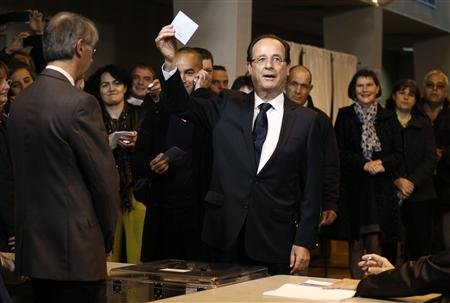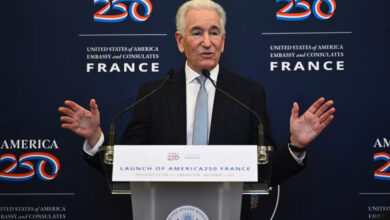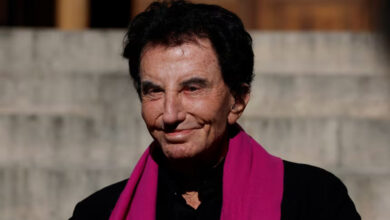
PARIS — France looked set to crown Francois Hollande as its first Socialist president in nearly two decades in an election on Sunday, marking a swing to the left at the heart of Europe and heralding a fight-back against German-led austerity.
Conservative President Nicolas Sarkozy, swamped by anger at a surge in unemployment during his five-year term, would be the 11th eurozone leader to be swept away by economic crisis after final opinion polls put Hollande at least four points ahead.
A wide margin of victory would give Hollande greater authority in pressing German Chancellor Angela Merkel to accept a shift in Europe's economic policy towards fostering growth and easing austerity that has sparked protests in southern Europe.
Greece's mainstream political parties were hammered in a parliamentary election on Sunday over rising economic misery due to IMF-imposed spending cuts, exit polls showed, raising doubts about Athens' future in the currency area.
Hollande cast his vote for the presidential runoff in the central town of Tulle, where he was mayor for seven years, shaking hands and kissing voters, many of whom he knows personally. "I am confident. I am sure," he told Reuters as he ate later in a local restaurant packed with Tulle residents.
Even before first results were declared, cheering crowds gathered in the street outside Socialist headquarters in Paris to celebrate what would be the party's first presidential victory since Francois Mitterrand was re-elected in 1988. Many waved red flags and some carried roses, the party emblem.
In Bastille square, flashpoint of the 1789 French Revolution and the left's traditional rallying point for protests and celebration, crowd barriers were ready and giant television screens erected in anticipation of an Hollande victory. Excited activists began partying two hours before the polls closed.
In Tulle, Hollande supporters drove around the town honking car horns.
Sarkozy was greeted by cheering crowds when he arrived to vote at a school in an up-market Paris neighborhood near the home of his wife Carla Bruni, a former supermodel.
"We are going to win" chanted supporters as the conservative leader briefly clasped the hands of well-wishers, but the glum faces of his advisers arriving at the Elysee presidential palace in late afternoon told a different story.
With 46 million people registered to vote, polling stations opened at 8 am (0600 GMT) and closed in most places at 6 pm (1600 GMT) and two hours later in big cities.
Interior ministry figures showed 72.0 percent of registered voters had cast ballots by 5 pm (1500 GMT) despite wet weather in much of the country, topping the 70.6 percent registered at the same stage of the first round on 22 April.
Reliable projections of the result based on a partial count were due as soon as the last polling stations closed. Media that publish exit polls or partial results in France before then risk fines and legal action.
Hollande, a mild-mannered career politician, has held a steady lead for weeks after outlining a comprehensive program in January based on raising taxes, especially on high earners, to finance spending and keep the public deficit capped.
As much as his own program, he is benefiting from anti-Sarkozy sentiment due to the incumbent's abrasive personal style and to anger about the same economic gloom that has swept aside leaders from Britain to Portugal.
"If Hollande is elected, we will have eliminated for personal reasons someone remarkably competent, not just in France but in Europe," said Christian Fabry, 72, among Sarkozy supporters waiting dejectedly in a Paris hall for the result.
Sarkozy needs miracle
Despite shaving a couple of points off Hollande's lead in the final days of a frenetic campaign, Sarkozy's own aides privately acknowledged it would take a miracle for him to clinch a second term.
"I'd say he has a one chance in six," a member of Sarkozy's inner circle told Reuters on condition of anonymity before campaigning ended on Friday.
BNP Paribas economist Dominique Barbet said that uncertainty about the election outcome was extremely low.
Photographer Gilles Leimdorfer said: "Both Sarkozy and Hollande would be capable managers of the French economy but Sarkozy has created too much discord.
"That is why I voted Hollande."
In Athens, French overseas voters voiced hope that a Hollande victory would temper Germany's drive for budgetary discipline which many say is driving a number of eurozone countries into recession.
"Enough is enough. There is too much austerity," 72-year-old Maria said, voting for Hollande at the French consulate.
Sarkozy launched his campaign late and swerved hard to the right as he tried to win back low-income voters that polls show have ditched him for either the radical left or extreme right.
His aggressive rallies and promises to rein in immigrant numbers, crack down on tax exiles and make the unemployed retrain as a condition of getting benefits did not reduce Hollande's lead. Sarkozy surprised many by failing to land anything like a knockout punch in a televised debate.
In two further blows in the last days of the race, far-right leader Marine Le Pen, who came third in the first round with 17.9 percent, and centrist Francois Bayrou, who came fifth with 9.1 percent, refused to endorse Sarkozy.
Economic credentials
The election comes at a crucial time for the eurozone as France, Europe's No. 2 economy, is a vital partner for Berlin.
If Hollande is elected, joining a minority of left-wing governments in Europe, he wants to renegotiate a budget discipline treaty signed by 25 EU leaders in March. Berlin has made the pact a pre-condition of aid for struggling states.
The Socialist plans to visit center-right Chancellor Merkel within days of the election to discuss his ideas and hoped to speak to her by telephone on Sunday evening, said Jean-Marc Ayrault, tipped as a likely Socialist prime minister.
France is grappling with feeble growth and 10 percent unemployment, a gaping trade deficit and high state spending that is straining public finances and was a factor in Standard & Poor's removing its triple-A credit rating.
While financial markets are warming to Hollande's growth agenda, given growing support elsewhere in Europe, analysts say he would need to reassure investors quickly about his economic plans as fears resurface over the eurozone's debt woes.
French 10-year bond yields fell to 2.87 percent on Friday, a level not seen since early October. Yet French debt could remain vulnerable to selling pressure, as markets and credit rating agencies wait to be convinced of his fiscal credentials.
While economists want Hollande to trim over-optimistic growth forecasts and impose spending cuts, political analysts fear this would be difficult with left-wing voters hoping he will raise the minimum wage and reverse a recent sales-tax rise.
Little known outside France, Hollande would soon have his diplomatic skills tested if he wins, with a Chicago NATO summit in late May and a Group of 20 summit in Mexico in late June. The former Socialist Party chief has never held a ministerial post.




